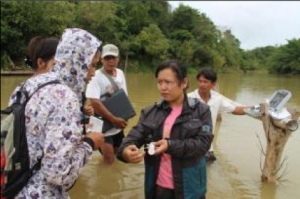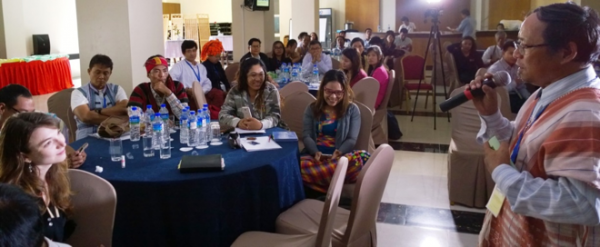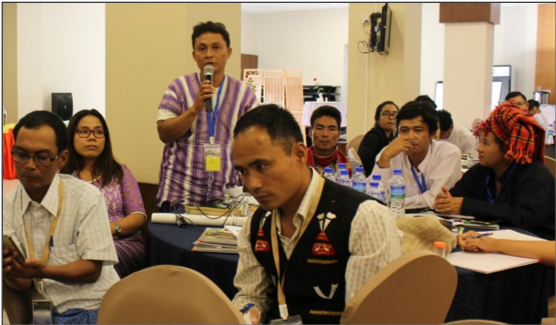First published on 06/25/2016, and last updated on 03/25/2018
By: Amalia Maling, WWF Myanmar and ICCA Consortium nominated honorary member
In line with the Promise of Sydney vision, POINT (the organization currently facilitating a national platform for indigenous peoples in Myanmar), WWF Myanmar and the ICCA Consortium joined forces in the spring of 2016 to organize the First Workshop on ICCAs in Myanmar. The groups met in Nay Pyi Taw, Myanmar on June 7-8, 2016, to focus on ways to increase awareness and better understanding of the role indigenous peoples and local communities have in governing and managing the country’s forests. More than 90 representatives from various indigenous peoples’ groups and networks in the country, local and international NGOs, and government agencies gathered together with these goals in mind.
Dr. Grazia Borrini-Feyerabend, Global Coordinator of the ICCA Consortium, and speakers from Indonesia and Philippines were invited to share their rich experiences and knowledge of ICCAs. “ICCAs are the ‘seeds’ of bio-cultural diversity around the world”, Dr. Grazia said. “They are found everywhere, span all types of ecosystems and cultures, have thousands of local names and are extremely diverse”.

Members of the community conducting water quality monitoring at Kamoethway watershed to determine impact of road construction © CSLD
The participants used the Myanmar conference as an opportunity to reflect on the ICCAs in their country, and they came up with a long list of ICCAs in different ecosystems – rivers, coastal, and forests. The length of this list is not surprising, since Myanmar is a region of Southeast Asia with richly diverse ethnicities. Some Karen participants from the Kamoethway community made an inspiring presentation on an outstanding ICCA in Tanintharyi Region, in the southern part of Myanmar. “We will protect our forest with or without recognition”, one of their leaders stated. After listening to the inspiring experiences highlighting the benefits of ICCA recognition in the Philippines and Indonesia, and seeing the possible protection from threats of mining and other unsustainable development, the Kamoethway group expressed a lively interest in learning more.
The participation of U Kyaw Kyaw Lwin, Deputy Director General of the Forestry Department, added to the importance of the event. His opening remarks highlighted Myanmar’s commitment to recognizing the customary rights of indigenous peoples and their ICCAs. Myanmar is one of the few countries that specifically targeted ICCA recognition in their National Biodiversity Strategic Action Plan (NBSAP). Target 11.1 of NBSAP states that 8% of Myanmar’s land area will be conserved in protected areas, including ICCAs, by the year 2020. One of the actions identified as essential to reaching that goal is a review of opportunities for different forest governance and pilot initiatives to test different governance types and forms of ICCA recognition.

U Saw Kho, Chairman of the Community Support and Livelihood Development group, sharing the experience of the Kamoethway community in strengthening governance of their natural resources © Gbf
This workshop was the founding moment for the appropriate recognition of ICCAs in Myanmar. With the help of the highly motivated participants, POINT and WWF Myanmar are committed to keeping the momentum alive through ongoing dialogue with government agencies. Continuing consultations with various IP groups and others will support the goal of establishing a strong and viable ICCA Network in Myanmar.
